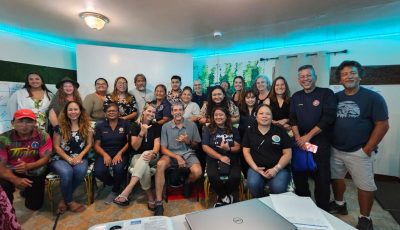BEH relocates; public urged to get rid of stagnant water
The Commonwealth Healthcare Corp.’s Bureau of Environmental Health has relocated to the hospital and all requests and inquiries can be made at its new location.
CHCC chief executive officer Esther Muña said that BEH will remain at the Commonwealth Health Center until further notice and that all services offered under BEH should be forwarded to the hospital.
BEH handles inspection requests such as renewal of sanitation permit/inspection or ship clearance and food handler requests such as food safety training or issuance and/or food handler certification.
Warren Villagomez, CHCC public health and hospital emergency preparedness program director, said that majority of CHCC’s incident command center has all departments working in one area for better collaboration.
For requests of services or concerns, contact BEH at 236-8731 or 234-8905 (operator) and ask for to be transferred to Ext. 8731.
Stagnant water
CHCC public health planner Kaitlyn R. Neises said any water around the house increases the number of mosquitoes.
“Mosquitoes are out in full force post-Typhoon Soudelor and CNMI residents have a large part to play in source reduction by eliminating the kinds of places that mosquitoes like to breed,” Neises said.
“All mosquitoes require water in which to breed and any increase in mosquito problems folks are experiencing are likely to come from water-filled containers that they can help to eliminate,” she added.
Anti-mosquito tips
– Drain all standing water around the house.
– Wear light, loose fitting clothing. Some of the 176 mosquito species are attracted to dark clothing and some can bite through tight-fitting clothes. When practical, wear long sleeves.
– Choose a mosquito repellant that has been registered with the U.S. Environmental Protection Agency. Repellants approved for use include DEET (N, N-diethyl-mtoluamide), picaridin (KBR 3023), and oil of lemon eucalyptus (P-methane 3, 8-diol, or PMD).
– Other ways to get rid of mosquitoes are:
• Dispose of any tires. Tires can breed thousands of mosquitoes.
• Drill holes in the bottom of recycling containers.
• Clear roof gutters of debris.
• Clean pet water dishes regularly.
• Check and empty children’s toys.
• Repair leaky outdoor faucets.
• Change the water in birdbaths once a week.
• Canoes and other boats should be turned over.
• Avoid water collecting on pool covers.
• Empty water collected in tarps around the yard or on woodpiles.
• Plug tree holes.
• Even the smallest of containers that can collect water can breed hundreds to thousands of mosquitoes. They don’t need much water to lay their eggs (bottles, barrels, buckets, overturned garbage can lids, flower pots, etc.)



























